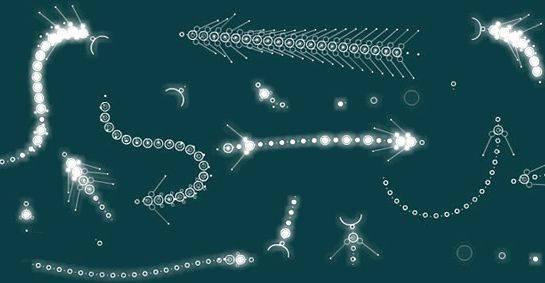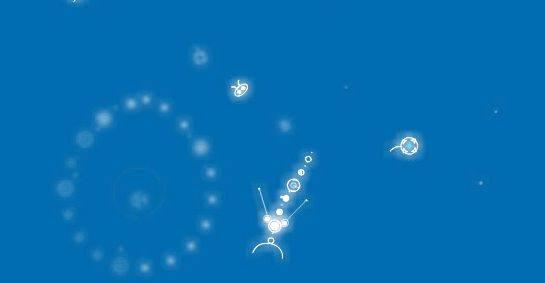Email interview with Jenova Chen conducted by N. Elizabeth Schlatter, January 2013
Congratulations on flOw being one of the games recently acquired by MoMA’s permanent collection. Does that acquisition reflect some of the goals you’ve had for your games and your company?
TGC [thatgamecompany] has been focusing on making games that introduce new kinds of emotional experiences. We are using video games to communicate strong feelings that are humane to our players, which I think is why people consider our games artistic. Out of all the games we’ve made, flOw is considered the least artistic game out of all the games we created. flOw is a test sample we made to prove that Mihaly Csikszentmihalyi’s psychology theory could be used to improve accessibility for a wide variety of users to enter a Flow state while playing games. So when it is acquired by MoMA’s permanent collection, I’m somewhat confused at first since it’s the least emotional game out of all the games we’ve made. Then I read the details that it’s a collection for video game starters. I guess the mouse control made it much more accessible than the other TGC games where players have to learn how to use a controller.
With many artists making time-based work, such as video and online pieces, time is a crucial component of their work, similar to how a painter thinks about paint. When you are designing a game, does the aspect of time factor into your decisions as much as aesthetics? And if so, since time is really variable depending on the game’s user (as opposed to a video which has a specific length of time), how do you consider the flexible factor of time in your games?
During the making of flOw.
the thing that matters the most is that time is our budget. We have to make our decisions to design the game so we can finish it and polish it before we run out of money. When it comes to players’ time spent with our game, we don’t try to control it, instead we want our players to take the time they need to engage with the game and practice their skills before they feel ready to move on. It’s an active difficulty management from the player’s subconscious, so their interactivity with the virtual world remains in the Flow zone.
Some reviews of your games talk about how the player brings herself into the game and has a unique experience because of the environment and challenges that are presented in response to her actions and choices. This is a little bit like artists who want to leave space within their art so that the viewers construct their own meaning, rather than the artists telling the viewers what to think. Does that seem like an apt analogy for how you want to construct the player’s experience within your games?
It depends on the title. Journey, out of all the games we made, is very much left for players to interpret. We wanted a spiritual journey. However, we don’t want to preach any specific version of religion. Therefore, we want to leave as much space as possible for the players to fill. In the game rather than relying on the traditional storytelling through text and cinema, we used &”story discovery&” as our way to communicate the narrative.

We want the player to discover the world, reveal pieces of ancient history that give abstract information and come up with their own understanding of what happened in the past and assign their own meaning to the journey they go through.
The development of flOw was informed by Mihaly Csikszentmihalyi’s theories of flow as applied to games, which you wrote about in your MFA thesis. Now that you run a game design company, how do you make sure that you still experience periods of flow, particularly in terms of creativity? And is it possible to ensure that the team has opportunities for flow as well?
There are many conditions for flow to happen during the creative process. At thatgamecompany, the creative process isn’t always smooth and great. What enabled us to enjoy the process slightly longer was probably due to the fact that we are very confident about what we are doing and therefore feel we are in control. Even though we don’t know what the game is going to be in the end, we are certain that the direction we are taking is proven in the traditional medium, like knowing that you are on a boat that will follow the river to the destination eventually. We might run into a couple hitches and obstacles here and there, but we are making progress towards the end goal. With that said, the development process of making creative projects is filled with up and downs, I doubt if the entire process is always in flow, whether it will actually be boring or not.
Jenova Chen (Chinese, born 1981) earned a B.S. at Shanghai Jiao Tong University and an MFA at University of Southern California, in the Interactive Media Division. He went on to found thatgamecompany where he remains its Creative Director. He has created the award-winning games Cloud, flOw, Flower, and Journey. Flower has been awarded the British Academy of Film and Television Arts for Artistic Achievement; Best Downloadable Game of the Year by the Game Developers Choice Awards; and Best Independent Game by Spike TV Video Game awards. The game Journey has received numerous awards since being released, including “Game of the Year” by GameSpot (2012); Best Director, Best Art Direction, and Best Sound Design by Telegraph Video Awards (2012), and Best Overall Game (among other awards) by IGN (2012). Chen has been named one of Variety ’s 10 Innovators to Watch (2008); Most Creative Entrepreneurs in Business (2009, 2010); and named by MIT’s Technology Review Magazine TR35 list as one of World’s Top Innovators under the Age of 35 (2008).






 Jms careless metropolitan hinterland thesis writing
Jms careless metropolitan hinterland thesis writing American style of reference writing for thesis
American style of reference writing for thesis Thesis writing linking words in spanish
Thesis writing linking words in spanish Thesis proposal defense presentation ppt des
Thesis proposal defense presentation ppt des Social media marketing communication thesis proposals
Social media marketing communication thesis proposals






